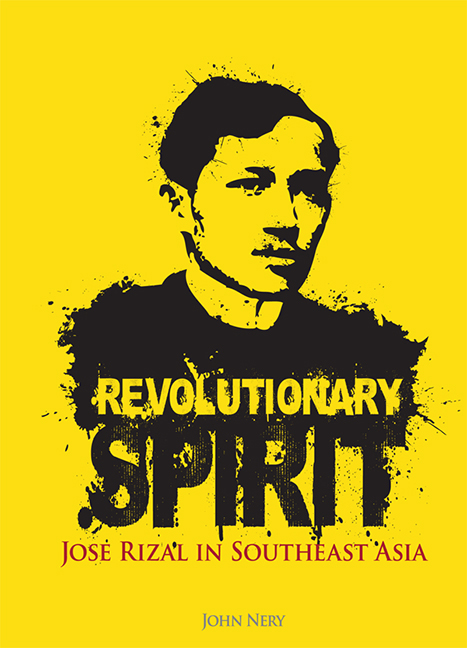Book contents
- Frontmatter
- Dedication
- Epigraph
- Contents
- Foreword
- Message
- Preface
- Acknowledgements
- INTRODUCTION The Uses of Error A Rizal Chronology
- 1 TURNING POINTS
- 2 “THE VERY SOUL OF THIS REBELLION”
- 3 DOCTOR RIZAL
- 4 “HALFBLOED”
- 5 “NO MARX OR LENIN”
- 6 UNDER THE SOUTHERN SUN
- 7 THE HOPE OF MILLIONS IN ASIA
- 8 “HIS NAME IS SWEET IN OUR MEMORY”
- 9 THE MYTH BUSTERS
- 10 “A GREAT HISTORICAL EXPERIMENT”
- Epilogue
- Appendices
- References
- Index
- Frontmatter
- Dedication
- Epigraph
- Contents
- Foreword
- Message
- Preface
- Acknowledgements
- INTRODUCTION The Uses of Error A Rizal Chronology
- 1 TURNING POINTS
- 2 “THE VERY SOUL OF THIS REBELLION”
- 3 DOCTOR RIZAL
- 4 “HALFBLOED”
- 5 “NO MARX OR LENIN”
- 6 UNDER THE SOUTHERN SUN
- 7 THE HOPE OF MILLIONS IN ASIA
- 8 “HIS NAME IS SWEET IN OUR MEMORY”
- 9 THE MYTH BUSTERS
- 10 “A GREAT HISTORICAL EXPERIMENT”
- Epilogue
- Appendices
- References
- Index
Summary
In 1986, when Goenawan Mohamad, the prominent Indonesian journalist, was prompted by the post-election turmoil in the Philippines in the last days of Ferdinand Marcos to write an essay on Jose Rizal, he drew a portrait of a conflicted, upper-class thinker, an “anxious Rizal [who] was not the type who would usually go on to become a hero” (Goenawan 2005: 192). A quarter of a century later, when Carlos Celdran, an enterprising social activist, wanted to protest the Catholic Church's position on the ongoing reproductive health debate in the Philippines, he simply went up the steps to the altar at the Manila Cathedral and held up a sign with a single word, a name, on it: “Damaso”. He was referencing a corrupt friar from Rizal's first novel, the Noli Me Tangere.
I find that the relative silence, even silent agreement, with which Goenawan's sketch will be received by college-educated Filipinos even today, and the enormous uproar that immediately greeted Celdran's protest, effectively define the parameters of this study into Rizal's influence in Southeast Asia. The philosophical Goenawan subscribes to the common mistake of an indecisive Rizal, perhaps undeserving of his pre-eminence but certainly relevant to public discourse in Southeast Asia. The political Celdran proves that, all along, Rizal remains a powerful source of potential subversion.
I could not have known it at the start, but the research into Rizal became an object lesson on the many uses of error. It is possible to gain a clear vantage point of Rizal and the revolutionary spirit with which he infused the struggle to create a Filipino nation in the late nineteenth century, and by which his example invigorated Indonesian nationalism and Malaysian scholarship, regional political discourse and world literature, in the twentieth — but it is a view overgrown with many obstructions, not all of them deliberately sown. I have used the Introduction to try and clear a path through the bramble.
This approach, I must admit, is congenial to me. It reflects the deepest instinct of my op-ed journalism, which is to engage another point of view. What a pleasant surprise during the research, then, to gain a better insight into it through Syed Hussein Alatas, the trailblazing Malaysian intellectual.
- Type
- Chapter
- Information
- Revolutionary SpiritJose Rizal in Southeast Asia, pp. xvii - xxPublisher: ISEAS–Yusof Ishak InstitutePrint publication year: 2011



